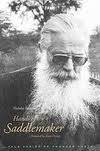
Perhaps these themes reflect his upbringing as the son of a leading Greek Orthodox bishop who moved his family from England to Massachusetts, or Samaras’ own life later in New York. Whatever the influence, his poems project a sense of distance and separation at the same time suggesting a quality of knowing exactly one’s place. In “Lost, ” for example, Samaras places his couple in a dark woods, away from civilization, as the forest “thickens with night.” Yet when they awake early the next morning, it may still be dark, but they know their pilgrimage is resuming:
Lost
The one thing warned against
we have accomplished with remarkable ease.
The path dissolves to darkness.
The forest thickens with night as we fumble
with sweat-dampened matches to set a fire.
On the mountain-slope, wolves chuck their moon-song.
Wild boards rummage the underbrush.
They are far enough away for us to breathe.
I watch while Nikita sleeps, shudders awake
To a blind hour. Embers glimmer a dull red.
Our clothes are limp with smoke
and we prop a paper icon against a tree stump,
chant an ancient tongue to God, tell ourselves
this is the way of all pilgrims.
But oh, how our arms ache
from holding the carvings of our own ribs.
In “In the Wake of Exile, ” this sense of separation and “separate-ness” is more explicit, as is the setting of the poem. One imagines a kind of prisoner being taking away from the familiar and the loving, or perhaps the pilgrim, who sleeps in a ship’s cabin that is much like a monk’s cell.
In the Wake of Exile
You have been in exile for two weeks.
Boarding the boat that takes you,
you are somewhere far off,
forgetting something,
stitching through a necklace of islands.
It is the journey you make in winter.
The moaning of engines, the heavy
Rumble below deck on a black-onyx sea.
You do not eat, and grow invisible.
Stripped of everything,
you sleep like this:
In a berth the size of your body,
your face stubbed into the lumpy pillow,
your left palm cradling
your bruised testicles.
The string of light fades in the hazy black.
The long beard you said goodbye to.
The long beard you know you are becoming.
The book you translate in your sleep.
On gaunt legs that feel unlike yours,
you leave the cabin and haunt the deck.
Stern-side, the waning moon
puddles in the froth of the wake.
Peer into darkness.
Write this star down.
These and the others in the collection are poems of pilgrimage and exile, where we are all strangers, to each other and to ourselves. Or as he concludes in the poem “When Grandfathers Leave, ” when the patrons of a tavern finally return home, “Each stranger’s expression and / cheekbones, a mirror of mine.”
Hands of the Saddlemaker is a quiet volume, fully deserving of rereading and contemplation.
Related:
The TweetSpeak Poetry feature on Nick Samaras for National Poetry Month.
A short study of a poem from this volume, published at The Master’s Artist.
Artist of the Month feature at Image Journal.
- Poets and Poems: Sandra Marchetti and “Diorama” - April 24, 2025
- Poets and Poems: Christina Cook and “Roaming the Labyrinth” - April 22, 2025
- Longfellow’s “Paul Revere’s Ride”: Creating a National Legend - April 17, 2025
L. L. Barkat says
I really liked …
“this is the way of all pilgrims.
But oh, how our arms ache
from holding the carvings of our own ribs.”
Maureen Doallas says
Lovely selections, Glynn.